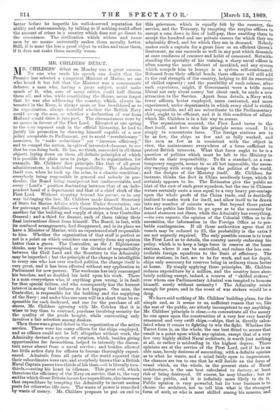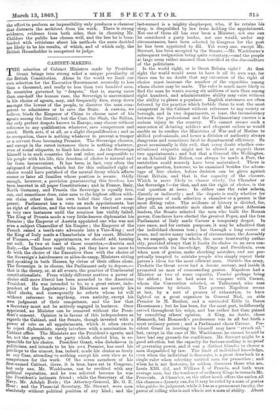MR CHILDERS' DRBUT.
RIB. CHILDERS' debut on Monday was a great success. No one who reads his speech can doubt that the Premier has selected a competent Minister of Marine, no one who heard it but felt that the Minister was a consummate debater, a man who, having a great subject, could make much of it, who, sure of many critics, could half disarm them all, and who, while conciliating the House, never forgot that he was also addressing the country, which, always interested in the Navy, is always more or less bewildered as to its organization, always doubtful whether the British Navy could sweep the seas, or whether a declaration of war from Holland would drive it into port. The circumstances were by no means in favour of the First Lord. Elevated at one spring to the very topmost rank in the official hierarchy, he had to justify his promotion by showing himself capable of a new policy acceptable to Parliament, yet to avoid ‘revolutionary " measures, to "make reductions" yet "increase efficiency," and to compel the nation, in spite of interested clamour, to see that he was doing both. He has, we think, succeeded in all those objects. laying down on them all definite principles of which it is possible for plain men to judge. As to organization, for example, Mr. Childers' first principle, like that of all great administrators, is individual responsibility. The Admiralty itself was, when he took up the reins, in a chaotic condition ; everybody being responsible in general and nobody in particular, the Board being omnipotent but undiscoverable, and every " Lord's " position fluctuating between that of an independent head of a department and that of a chief clerk of the First Lord. Without stepping beyond his patent, or in any way infringing the law, Mr. Childers made himself Secretary of State for Marine Affairs with three Under Secretaries; one for patronage and discipline,—a Commander-in-Chief, in fact ; another for the building and supply of ships, a true Controller General ; and a third for finance, each of them taking their final instructions direct from himself. The Board, in fact, with its confused arrangements, had disappeared, and in its place we have a Minister of Marine, with an experienced staff responsible to him. 'Whether the organization of that staff is perfect or not is a point on which outsiders can scarcely form any opinion better than a guess. The Controller, as Sir J. Elphinstone thinks, may be overweighted, or the division of responsibility between the Civil Lord and the Secretary to the Admiralty may be imperfect ; but the principle of the change is intelligible to every one who has ever studied politics, the change itself is very great, and it has been effected without any application to Parliament for new powers. The workman has only rearranged his benches, and so doubled his hold upon his work. There is a man everywhere who, if anything goes wrong, is in fault for that special failure, and who consequently has the keenest interest in seeing that failures do not happen. One man, the Controller, is responsible for the building and the supplying of the Navy ; and under him one man will in a short time be responsible for each dockyard, and one for the purchase of all stores, Mr. Childers agreeing with Mr. Cobden that it is wiser to buy than to contract, purchase involving security for the quality of the goods bought, while contracting only involves a fair selection among dealers.
Then there was a grand defect in the organization of the active service. There were too many officers for the ships employed, and as officers could not be left altogether without work, the Admiralty devised a system of rotation, which, besides giving opportunities for favouritism, helped to intensify the discontent never absent from a naval service ; and besides, allowed too little active duty for officers to become thoroughly experienced. Admirals from all parts of the world reported that their subordinates were raw, and everybody knows that a British Naval Captain passes two-thirds of his time,—it is literally twothirds,—eating his heart in idleness. This great evil, which threatens the efficiency of the Navy on service, that is, the very end for which Great Britain incurs her expenditure, also increases that expenditure by tempting the Admiralty to invent useless posts for otherwise idle men. The waste of power is reme lied by waste of money. Mr. Childers proposes to put an end to this grievance, which is equally felt by the country, the service, and the Treasury, by tempting the surplus officers to. accept a sum down in lieu of half-pay, thus enabling them to accept the hundred and one private careers for which they are admirably fitted, and for which they are in demand. Nobody makes such a captain for a great liner as an efficient Queen's lieutenant, no one succeeds so well in any post which demands. atonce readiness of resource and habit of command. Notwithstanding the specialty of his training, a sharp naval officer is often among the most efficient of mankind, and any system which compels him to lounge is a system self-condemned_ Released from their official bonds, these officers will still add to the real strength of the country, helping to fill its reservoirof skilled capacity ; and the possibility of such release, aftersuch experience, might, if Government were a trifle more liberal not only about money but about rank, be made a new attraction to the Service. Apart from details, a Navy with fewer officers, better employed, more contented, and more experienced, under departments in which every chief is visibleand responsible, and all are subordinate to the Parliamentary chief, ought to be efficient, and it is this condition of affairs which Mr. Childers is in a fair way to secure.
The organization secured, the First Lord turns to the fleet itself, and here also his principle seems sound. It is. simply to concentrate force. The foreign stations are to be as few, the ships as few and as fully worked, and the men as few as is consistent with the object in view, the maintenance everywhere of a force sufficient toprotect British interests. What that force ought to be is a question of politics which must be left to the Ministry to. decide on their responsibility. To fix a standard, as a contemporary suggests, seems to us all but impossible, the necessity varying with every change in the politics of the world, and the designs of the Ministry itself. Mr. Childers, for instance, thinks the fleet in China needlessly large, which it certainly appears to be. The Estimates give the public no hint of the cost of each great squadron, but the one in Chinese waters certainly costs a sum equal to a very heavy per-centage upon the whole profit of the China trade, and is decidedly inclined to make work for itself, and allow itself to be drawn into any number of minute wars. But beyond those patent facts the public has little to go upon as to the necessity for armed steamers out there, while the Admiralty has everything, —its own reports, the opinion of the Colonial Office as to its necessities, the information in the Foreign Office as to probable contingencies. If all these authorities agree that 34 vessels may be reduced to 25, the probability is the extra 9 are not urgently required. The only possible course is to trust the First Lord as to details, the country merely endorsing his policy, which is to keep a large force in reserve at the home stations, where it can be controlled, and reduce the less controllable foreign squadrons to the limit of efficiency. Thelatter stations, in fact, are to be for work, and not for depot, ships only necessary for reserves being in ordinary times better at home. By simply applying these principles, Mr. Childers-. reduces expenditure by a million, and the country loses absolutely nothing except, indeed, a reserve of "skilled stokers," over whom one Parliamentary Admiral was tempted to bemoan himself, surely without necessity ? The Admiralty retain enough for peace, and in the event of war stokers would be a drug.
We have said nothing of Mr. Childers' building plans, for the simple and, as it seems to us, sufficient reason that we, like the rest of the public, are utterly incompetent to say anything. Mr. Childers' principle is clear,—to concentrate all the money he can spare upon the construction of a very few very heavily armoured and very swift ships,—ships, that is, directly calculated when it comes to fighting to win the fight. Whether the Turret form is, on the whole, the one best fitted to secure that result is a point upon which any opinion, except that of a very few very highly skilled Naval architects, is worth just nothini at all, or rather is misleading in the highest degree. Those opinions are at the service of the First Lord, and if be is an, able man, keenly desirous of succeeding, with a definite opinion as to what he wants, and a mind fairly open to impressions, the chances are ten to one that he will decide on the form of vessel which, on the whole, in the present state of Naval architecture, is the one best calculated to destroy, at least risk of being destroyed. Of course, he may blunder ; but somay the public, and it is infinitely more likely to do it. Public opinion is very powerful, but its true business is to choose the architect, not to tell him what is the strongest form of arch, or who is most skilled among his masons, an&
the effort to perform an impossibility only produces a clamour that distracts the architect from his work. There is strong evidence, evidence from both sides, that in choosing Mr. Childers the public has chosen well, and the less he is bombarded with criticisms about his methods the more decided are likely to be his results, of which, and of which only, the British Householder is competent to judge.



































 Previous page
Previous page